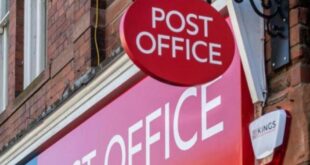The obituary for share trading in London has been written many times.
However, the latest data shows that London’s equity markets have regained leadership over Paris, in spite of France hosting LVMH, Europe’s most valuable enterprise.
Fears of an ultra-Right government in France have given London the edge.
Confidence in the UK as a venue for listings has also been underpinned by the recent surge in the price of computing firm Raspberry Pi, with the shares climbing 55 per cent since arriving on the London exchange last week.
There are now hopes of more bigger listings to come with controversial online Asia-based fashion group Shein among contenders.
Recovery: Latest data shows that London’s equity markets have regained leadership over Paris, in spite of France hosting LVMH, Europe’s most valuable enterprise
Nevertheless, the City is having a hard time.
A succession of companies, the latest is the plant-hire giant Ashstead, is enviously looking to New York where most chief executives (Elon Musk is the exception) escape intense scrutiny over fat cat pay awards. A series of firms has already fled across the Atlantic.
Flutter, parent company of betting brands Paddy Power, Betfair and Sportsbet, approved a shift of its primary share listing from London to New York last month in search of a higher valuation.
Among the most serious recent losses to the New York exchange is Cambridge-based tech firm Arm Holdings, the UK’s most significant AI trailblazer, which also designs the microchips used in Apple devices.
In September last year – despite a spirited campaign by Chancellor Jeremy Hunt – Arm listed its shares in New York with an astronomic valuation of £43billion. The shares have leapt in value and are worth well over £100billion.
Other firms to have chosen New York over London include building materials giant and Tarmac owner CRH, plumbing champion Ferguson, and the owner of private members’ club network Soho House.
Shell, the biggest corporation in the UK behind AstraZeneca, has not discouraged speculation that it may one day defect to the Big Apple.
The energy giant has expressed fears about an unfriendly future in Britain amid Labour’s plans to ladle further taxes on North Sea explorers.
There are also concerns that consumer goods giant Unilever – Britain’s fourth most valuable company – could spin off its vast ice cream operation into a separate company worth an estimated value of £15billion and list it in New York or Amsterdam rather than London.

Jeremy Hunt: Lost out in fight over Arm
The New York Stock Exchange has long outperformed its London-based counterpart. American investors have greater resources at their disposal, leading to higher share prices and better returns.
This is a major source of concern in Whitehall, as attracting investment through the London Stock Exchange is critical to our national economic growth, because it not only creates jobs in financial services but provides opportunities and returns for UK investors.
Brexit uncertainty has hurt the London Stock Exchange’s fortunes in recent years. The war in Ukraine has also played its part, undermining London’s reputation as a centre for trading in natural resource stocks.
Shares in Russian mining stocks are suspended as a result of sanctions following President Putin’s war on Ukraine.
The world’s largest metals mining group BHP listed shares nearer to the centre of its operations in Australia in 2021.
Copper and De Beers diamond powerhouse Anglo American bucked the trend last month when it saw off several bids from BHP and decided to go it alone.
The roots of the London Stock Exchange’s decline can be traced back to 1997 and the ascension of New Labour.
When Tony Blair took office, at least 35 per cent of UK pension fund money was invested in British firms but, almost immediately, Chancellor Gordon Brown removed Britain’s private pension funds’ privileged tax status.
While this proved to be a lucrative move from the Government’s point of view, generating more than £5billion a year for the Exchequer, it removed the incentive for investors to prioritise the UK. Many took their money elsewhere – such as to the US – in search of greater returns.
A quarter of a century later, and just 4.7 per cent (down from 35 per cent) of Britain’s pension contributions are invested in the FTSE 100 (the top 100 companies on the London Stock Exchange). Instead, the FTSE 100 is dominated by overseas investors – many of them American – in it for a quick buck.
Major UK investors have understandably had their heads turned by the huge returns to be made investing in Silicon Valley tech giants and fast-growing Asian businesses.
The lack of investor quality has inevitably meant a collapse in the value of UK-listed companies. As a consequence, many of Britain’s most iconic brands have been bought on the cheap by foreign investors taking advantage of what’s embarrassingly known as the ‘London discount’.
Companies which have suffered such a fate include chocolate giant Cadbury, airport owner BAA, Thames Water and brewers including Scottish & Newcastle. Royal Mail owner International Distribution Services is set to be swallowed by mystery Czech billionaire Daniel Kretinsky unless the authorities intervene.
Before the election was called, Rishi Sunak’s government was seeking to revive the London Stock Exchange.
Tough rules imposed on newly quoted London companies, designed to protect investors from undue risk, are being eased. Meanwhile, local authorities and certain pension funds are being encouraged to invest in UK stocks and infrastructure.
There are early signs that the medicine is working.
LSE-listed electronics retailer Currys resisted bids from activist investor Elliott to take the company private. On Valentine’s Day, Kazakhstan’s national carrier, Air Astana, chose to list in London.
The London Stock Exchange has faced sterner challenges in a history that stretches back over four centuries. It has weathered two world wars, the disastrous return to the gold standard in 1931 and Brexit.
So despite a ghastly period for the City’s reputation as the home of the free market, I am not abandoning hope – even with fears that a Labour government will clamp down on wealth creation.
The UK’s tech and service-driven economy is in a good place, inflation is falling and growth bouncing. As prosperity returns, the fortunes of UK-listed companies are starting to reverse.
Some links in this article may be affiliate links. If you click on them we may earn a small commission. That helps us fund This Is Money, and keep it free to use. We do not write articles to promote products. We do not allow any commercial relationship to affect our editorial independence.
Source link

